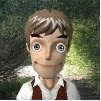Hearing the Firesign Theatre for the first time was a life-changing event for me. But I struggle to explain it because there's so much cultural and historical baggage attached; I worry that someone new to FT would need an annotated transcript to get 60% of the jokes. Here's the deal: Firesign wrote comedy material specifically for the LP medium, meant to be listened to multiple times. Unlike comedy albums of the time, they weren't just recordings of live performances but (again) specifically crafted to be multi-layered -- I STILL find jokes I missed every time. And they were
funny, really funny.
Sometimes the FT gets lumped in with Monty Python, two comedy troupes from (relatively) the same era. But I'd suggest there are vast differences: while I can watch MP skits again and again, there's rarely anything new to hear (other than an obscure-to-me British pop culture reference). I love the familiar, and wait for my favorite lines. And there are times when I can be amused by the concept of a sketch rather than the actual sketch itself. MP were much better presented on screen; FT never seemed comfortable on screen (or even sometimes live), so their best presentation is in audio. Hard to cross over there. Firesign, stuck in radio in a TV world.
Finally, FT wrote long-form pieces, each one 20 minutes plus. Who listens to
anything like that in one sitting anymore? The sad thing for me is that FT wrote stuff way ahead of its time, and yet now, when we can actually understand and appreciate their prescience, their audience has, for the most part, disappeared.
But enough handwringing. For the initiate, the 2 CD compilation "Shoes for Industry: The Best of the Firesign Theatre" is a good collection, and it contains the complete Nick Danger sketch, which is most people's introduction to Firesign World.
The first album "Waiting for the Electrician or Someone Like Him" has its moments, but they really hit their stride with the next 3 classic albums ("How Can You Be In Two Places at Once When You're Not Anywhere At All", "Don't Crush That Dwarf, Hand Me the Pliers", and "I Think We're All Bozos on This Bus"). There were still fine albums ahead; my favorites include "The Tale of the Giant Rat of Sumatra" (probably their most pun-filled album), "Everything You Know Is Wrong", even their much later Rhino albums like "Give Me Immortality or Give Me Death" and "Boom Dot Bust", but a lot of the albums after the classic 3 were spotty (but the good spots were great -- our family is always quoting from "Ben Bland's All-Day Matinee" from the much maligned "Just Folks ---A Firesign Chat" -- initially released on Butterfly, a disco label!)
Firesign were and are great, and great fun too. Consider listening to some on your next road trip ('on the freeway, which is already in progress') -- who knows where you might end up?










